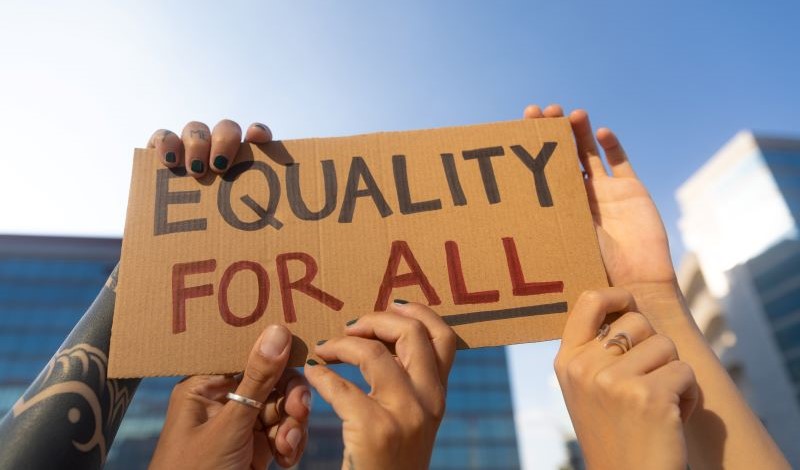
Scholars discuss the legal and practical implications of the Trump Administration’s Anti-DEI policies.
In Executive Order 14151, titled “Ending Radical And Wasteful Government DEI Programs And Preferencing,” President Donald J. Trump took a strong stance against government and private-sector programs and policies aimed at fostering diversity, equity, and inclusion (DEI). DEI efforts, the Trump Administration states, are forms of “illegal and immoral discrimination.” This and other executive orders direct federal agencies and contractors to terminate DEI programs. The Administration also directed agencies to investigate and threaten legal action against private corporations, universities, and nonprofits that refuse to comply with DEI rollbacks.
Twelve pending lawsuits challenge DEI-related executive actions.
Federal DEI policies stem from President Lyndon B. Johnson’s Executive Order 11246—signed one year after the Civil Rights Act of 1964 was ratified. In this order, Johnson made it the policy of the federal government to “provide equal opportunity in Federal employment for all qualified persons” and prohibited employment discrimination based on membership in a protected class, such as race or sex.
Johnson’s order contributed to social progress—in the five years after the order was signed, the median income for Black households increased 94 percent. Pay discrepancies, however, persist—albeit to a lesser extent.
President Trump rescinded Executive Order 11246 on his first day in office. Critics strongly condemned the president’s decision, emphasizing the importance of diversity and that dismantling DEI initiatives could undermine longstanding efforts to address systemic inequities.
The Trump Administration has targeted large law firms and universities with DEI programs. President Trump issued executive orders suspending security clearances for all lawyers at Paul, Weiss, Rifkind, Wharton & Garrison and Perkins Coie in response to purportedly discriminatory diversity policies at those firms. As another step toward dismantling DEI programs, the U.S. Equal Employment Opportunity Commission sent letters to 20 additional law firms requesting information about their DEI programs.
Similarly, the Interim U.S. Attorney for the District of Columbia, Edward Martin, Jr., sent a letter to William Treanor, the Dean of the Georgetown University Law Center, threatening to refuse students employment opportunities in his office until the law center changes its curriculum to exclude DEI material.
Responses from the targeted organizations have been mixed. Treanor refused to accede to the U.S. Attorney’s demands. In a response letter, Treanor contends that Martin’s threats violate the university’s First Amendment rights and fundamentally conflicts with “the University’s mission as a Jesuit and Catholic institution.”
Perkins Coie challenged the constitutionality of the executive order accusing it of “discriminatory” DEI practices. The firm argues that the “plain purpose” of the order “is to bully those who advocate points of view that the President perceives as adverse.”
Other firms––including Paul, Weiss, Rifkind, Wharton & Garrison––reached controversial settlement agreements with the Administration.
A number of junior attorneys resigned after their firms reached settlement agreements with the government that included promises to eliminate all DEI programming. Several of these resignations have received high-profile national media coverage. Other firms have remained silent, prompting hundreds of their associates to sign an open letter urging firms to stand against “attempts to weaponize the Executive against the rule of law.”
The outcomes of pending legal challenges will determine the effects of the Administration’s position on DEI.
In this week’s Saturday Seminar, scholars discuss the legal and practical implications of the Trump Administration’s attacks on DEI.
- The power of the president to dictate DEI policies in the private sector is limited, contends Stacy Hawkins of Rutgers Law School in a Brookings Institution article. Hawkins notes that executive orders represent the policy positions of a presidential administration but do not carry the force of law. Since the president is the chief executive officer, Hawkins argues that the orders can dictate the administration’s civil rights enforcement priorities. The orders do not, however, determine the legality of DEI programs, Hawkins maintains. Hawkins explains that the judicial branch—with the sole authority to interpret the law—makes this determination. Under current U.S. Supreme Court precedent, Hawkins points out, DEI efforts remain legal and “commendable.”
- The Supreme Court’s holding that affirmative action is unconstitutional changed the legal landscape surrounding DEI, explain practitioners Meredith Gregston and Ryan Glasgow in an article in Business Law Today. Gregston and Glasgow find that, in the year following the decision, civil rights lawsuits challenging scholarship programs and corporate DEI programs increased. These lawsuits––most of which were dismissed––claim that DEI policies constitute “reverse racism” in violation of Section 1981 of the Civil Rights Act of 1866, note Gregston and Glasgow. To avoid potential legal challenges, Gregston and Glasgow recommend that employers train staff on the importance of inclusion in the workplace and communicate the intent of DEI policies.
- Black candidates may be more inclined to apply to job postings asking for statements about DEI than white or conservative applicants, Abigail M. Folberg of the University of Nebraska, Omaha and several coauthors argue in a recent article in the Journal of Occupational and Organizational Psychology. The Folberg team contends that race-neutral criticisms of the practice of using diversity statements often are underlied by racism and racist motives. In organizations that do not provide evidence of existing diversity, the Folberg team argues, requests for DEI statements may concern applicants from marginalized groups about their ability to be hired. Organizations must strike a balance between genuine promotion of racial equity and reconciling a divisive political climate, the Folberg team concludes.
- In a recent article in the CUNY Law Review, Ally Coll of CUNY School of Law argues that the Supreme Court’s willingness to relax standing requirements in anti-discrimination cases brought by non-minority plaintiffs threatens protections granted by the Equal Protection Clause. Coll notes that several lawsuits have been filed against private companies for their diversity fellowship programs in response to the Court’s decision in Students for Fair Admissions v. Harvard, and many private companies are changing the criteria for these programs or ending them altogether to protect themselves from potential litigation. Coll contends that it is only a matter of time before one of these suits reaches the Court and private diversity initiatives are deemed illegal.
- Critical Race Theory could potentially save DEI training programs in private companies, argues Tanya Katerí Hernández of Fordham School of Law in an article in the UCLA Law Review. Hernández explains that private DEI training programs are well-received when they focus on the systematic and structural components of racism, instead of individual bias. Hernández also contends that the current bans on Critical Race Theory mischaracterize this critique of the systemic and structural nature of racism, particularly within the education system, as anti-white discrimination. Hernández concludes that including Critical Race Theory in DEI training programs will make them both more popular and more effective at protecting civil rights.
- In a recent article in the Molecular Biology of the Cell, Vijayvardhan Kamalumpundi of the Mayo Clinic and several coauthors argue that the fields of science, technology, engineering, mathematics, and medicine (collectively, STEM) must understand the implications of anti-DEI legislation and preserve existing support structures for marginalized communities, including DEI centers. The Kamalumpundi team argues that the “lack of rigorous methods” to measure and report the impact of DEI programs is an obstacle to sustaining DEI programs. Within DEI programs, the Kamalumpundi team advocates mentorship initiatives as part of DEI programming. DEI initiatives help decrease “existing disparities in racial and gender parity,” and benefit STEM research and health equity, the Kamalumpundi team concludes.
The Saturday Seminar is a weekly feature that aims to put into written form the kind of content that would be conveyed in a live seminar involving regulatory experts. Each week, The Regulatory Review publishes a brief overview of a selected regulatory topic and then distills recent research and scholarly writing on that topic.



